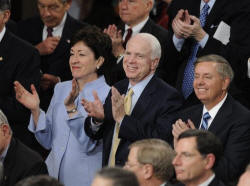|
 Congress finds consensus on Iraq plan Congress finds consensus on Iraq plan
 Send a link to a friend
Send a link to a friend
[February 28, 2009]
WASHINGTON (AP) --
After years of bitterly debating whether to set a timetable for troop withdrawals in Iraq, Congress has agreed to one.
The general consensus came Friday in the form of statements endorsing President Barack Obama's plan to bring home roughly two-thirds of the U.S. military force in Iraq by August 2010.
|
|
 It was a compromise of sorts for the Democratic president, who campaigned on the promise of bringing every soldier and Marine home from Iraq within 16 months of taking office. His plan paves the way for some 100,000 troops to come home and as many as 50,000 troops to remain behind to train Iraqi forces and protect U.S. interests. It was a compromise of sorts for the Democratic president, who campaigned on the promise of bringing every soldier and Marine home from Iraq within 16 months of taking office. His plan paves the way for some 100,000 troops to come home and as many as 50,000 troops to remain behind to train Iraqi forces and protect U.S. interests.
Not everyone was happy. Democratic leaders have suggested the 50,000 figure was too high and their more liberal rank-and-file swiftly rejected it. Republican leaders demanded assurances the plan would be abandoned if security conditions worsened. At least one hardline conservative cast the timeline as arbitrary and dangerous.
But in the end, the Congress that could never agree on how to win the Iraq war found common ground.

"President Obama's announcement of a withdrawal schedule for U.S. combat troops in Iraq is good news, because it signals that the war is coming to an end," said House Speaker Nancy Pelosi, D-Calif.
Added Sen. John McCain, who sparred with Obama on the merits of a timetable for the war in a bid for the presidency: The president's plan "is one that can keep us on the right path in Iraq."
The consensus was driven largely because conditions in Iraq have improved and public outcry on the war has been far less acute. Democrats are less likely to hear from angry voters demanding a firmer stance to end the war, whereas Republicans are able to say the timetable has the endorsement of military commanders.
[to top of second column] |
 Also in Obama's corner is that Republicans have already agreed to a timeline. Last year, under pressure to replace a U.N. mandate authorizing the presence of U.S. forces in Iraq, then-President George W. Bush agreed with Iraq that American troops should leave Baghdad and other cities by the end of June and all U.S. forces should be gone by the end of 2011.
Democrats are casting Obama's plan as an acceleration of that timeline. But the plan still leaves behind a large enough residual force behind to appease Republicans, who warn security gains could be lost if troops leave too soon.
"After all the tragic losses of life, after the hundreds of billions of dollars spent, after all the other costs our country has absorbed as a result of the conduct of this war, we are finally on a path to success," said McCain, R-Ariz.
[Associated
Press; By ANNE FLAHERTY]
Copyright 2009 The Associated
Press. All rights reserved. This material may not be published,
broadcast, rewritten or redistributed.
 |